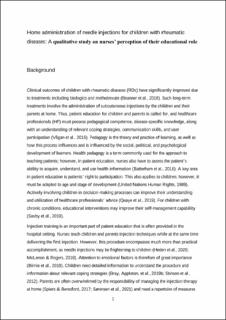| dc.contributor.author | Sørensen, Kari | |
| dc.contributor.author | Skirbekk, Helge | |
| dc.contributor.author | Kvarstein, Gunnvald | |
| dc.contributor.author | Wøien, Hilde | |
| dc.date.accessioned | 2023-04-21T10:54:27Z | |
| dc.date.available | 2023-04-21T10:54:27Z | |
| dc.date.created | 2022-10-04T08:55:17Z | |
| dc.date.issued | 2022 | |
| dc.identifier.citation | Sørensen, K., Skirbekk, H., Kvarstein, G., & Wøien, H. (2022). Home administration of needle injections for children with rheumatic diseases: A qualitative study on nurses’ perception of their educational role. Journal of Pediatric Nursing, 66. | en_US |
| dc.identifier.issn | 0882-5963 | |
| dc.identifier.uri | https://hdl.handle.net/11250/3064236 | |
| dc.description.abstract | Purpose: To explore nurses' perceptions of their educational role, pedagogical competence, and practice in teaching children with rheumatic diseases and their parents to manage subcutaneous injections at home.
Design and methods: In this qualitative study, we used thematic analysis to analyze data from three focus groups with 14 nurses responsible for patient education at one pediatric ward and two outpatient clinics.
Results: We identified three main themes capturing nurses' perceptions of their educational role: myriad expectations, awareness of own competence, and facilitation and prioritization of patient education. Nurses perceived patient education as an expected but challenging duty of their work. They described a lack of pedagogical competence, insecurity in managing parents' and children's fears and worries, and limited organizational structures guiding their educational role. Nurses who worked in outpatient clinics felt freer to individualize education compared to ward nurses.
Conclusions: Nurses perceive their educational role as significant in enabling children and parents to manage subcutaneous injections at home; however, they require pedagogical competence integrated with daily practice to provide high-quality care. Short-term admissions require a different organization of patient education than before.
Practical implications: Nurses need increased training in communication and management of children's pain and fear during needle injections. Competence development should include opportunities for reflection and guidance in clinical practice. Pediatric specialist nurses at outpatient clinics seem to have better competence to provide individual patient education for these families. The potential advantage of web-based solutions for nurses' patient education is a promising avenue for future research. | en_US |
| dc.language.iso | eng | en_US |
| dc.rights | Navngivelse 4.0 Internasjonal | * |
| dc.rights.uri | http://creativecommons.org/licenses/by/4.0/deed.no | * |
| dc.subject | Barnesykepleie | en_US |
| dc.subject | Klinisk praksis | en_US |
| dc.subject | Kvalitativ forskning | en_US |
| dc.title | Home administration of needle injections for children with rheumatic diseases: A qualitative study on nurses’ perception of their educational role | en_US |
| dc.title.alternative | Home administration of needle injections for children with rheumatic diseases: A qualitative study on nurses’ perception of their educational role | en_US |
| dc.type | Journal article | en_US |
| dc.description.version | submittedVersion | en_US |
| dc.rights.holder | © The Author(s) 2022. | en_US |
| dc.source.pagenumber | e137-e144 | en_US |
| dc.source.volume | 66 | en_US |
| dc.source.journal | Journal of Pediatric Nursing : Nursing Care of Children and Families | en_US |
| dc.identifier.doi | 10.1016/j.pedn.2022.04.011 | |
| dc.identifier.cristin | 2058138 | |
| cristin.ispublished | true | |
| cristin.fulltext | preprint | |
| cristin.qualitycode | 1 | |

